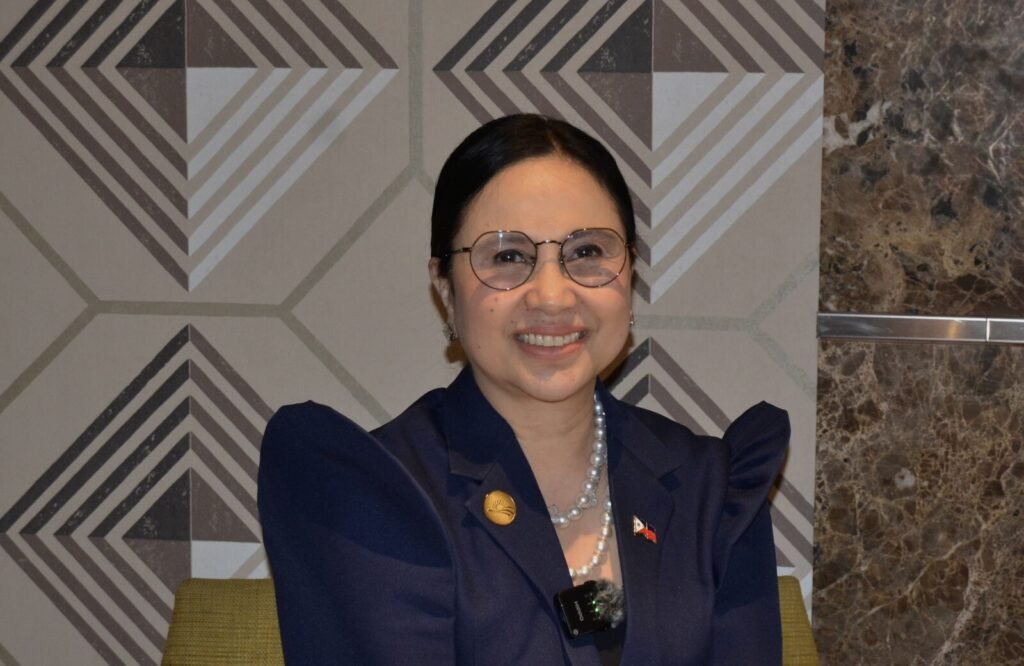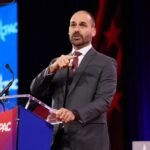|
Getting your Trinity Audio player ready...
|
In the frame of the Asia-Pacific Economic Cooperation (APEC) Summit held this year in Lima, Peru, the Secretary (Minister) of the Department of Trade and Industry of the Philippines, Maria Cristina Aldeguer-Roque, discusses with Newsyman her country’s strategies and priorities regarding international trade and investment. Roque addresses the potential impact of U.S. President Donald Trump’s reelection on the Philippines. She is also asked about countries competing with the Philippines, such as China, and the recently inaugurated port in northern Lima.
President Ferdinand Marcos Jr.’s special envoy to APEC provides insights into a positive impact on relations between the Philippines and Latin America. The minister also comments on the use of artificial intelligence in global trade, particularly in the Philippines, emphasizing its applications in consumer protection and information facilitation.
In Latin America, the Philippines maintains embassies only in Argentina, Brazil, Chile (also accredited to Ecuador and Peru), Mexico, and, more recently, Colombia (opened this year). This leaves countries such as Uruguay, Paraguay, Bolivia, Venezuela, Guyana, and Suriname without direct embassies, as well as most nations in Central America and the Caribbean. In many of these cases, diplomatic relations are managed through embassies in neighboring countries or concurrent representations.

What are your main objectives in international trade policy?
Our main objective is to promote the Philippines as a place where investors are welcome and where international investments are very much needed. We are really looking forward to increasing a lot of these international trading investments.
The Philippines is competing to position itself as a manufacturing hub in Asia. What measures are being taken to enhance competitiveness compared to other countries like China?
In the Philippines, we are really making it where we are really welcoming a lot of trade and international investments. Why? Because we are very competent in terms of the skills of the Filipinos. We have a lot of business incentives. We just launched the CREATE MORE last week, which makes it now more conducive and attractive for international investors for the different international investors to come in. And we have a lot of incentives to give them. We have a lot of different skilled workers. We have a lot of things to offer those who want to bring trade and investments into our country.
What impact do you foresee in the trade relationship between the Philippines and Latin America in the coming years?
First and foremost, I heard that there’s a port that’s going to be opening this week. That will really shorten the time, the shipment time from here, Peru, all the way to Asia or to the Philippines. So that’s really a big plus. So there will be a lot of trade now that will be happening between Latin America and the Philippines and in Asia. So I look forward to that new port that’s going to be open. And it’s a deep sea port, so that means that a lot of big vessels are going to be coming in.
So that will have an aggressive impact on the Philippines and trade between Latin America and the Philippines. So for us to be able to sell the goods all the way to Latin America, we need to pay tariffs every time we stop. But now it’s a direct shipment from here, from Peru, all the way to the Philippines. So that’s really welcome to our country.
How would the current trade relations between the Philippines and the United States be affected by the re-election of Donald Trump?
The Philippines and the United States are real allies. We have a really good relationship between the Philippines and the United States. So I don’t think there’s going to be a problem with the trade between the U.S. and the Philippines. So I think the trade will continue, and I think the Philippines will be having an aggressive approach in our trade relations between the Philippines and the United States.
What is your stance on the rise of artificial intelligence (AI), and how do you think it will impact global trade? Are there plans to further integrate these technologies in the Philippines?
AI is very strong now globally, and that’s also the mandate of our president, which is to go digital and to use AI to be able to advance different businesses. So for businesses, AI will be used to be able to get information, to be able to address, let’s say, frequently asked questions, and to be able to do a lot of things that are redundant so that it will be easy for us to be able to get information and get it across. For the consumers, for the consumer protection, which is very important for our country, we also use AI for the frequently asked questions and to be able to deal with the different, usual activities that happen between the consumers and, of course, the manufacturers.
What are the Philippines’ main priorities in the industrial sector?
For the industry sectors, for the international trade, we’ve got a lot of priorities, actually. One is the renewable energy. We’ve seen a lot of renewable energy investments coming from our country. Another one is also the semiconductor, which is also very strong in our country. And then there’s also the EV, the electric vehicles, and the battery industry, manufacturing, which is also very strong in our country. So we’ve got a lot of these different industries that are very strong in our country. And, of course, MSME, which is the Micro, Small, and Medium Enterprises, which is also very strong in our country. 99.5% of the business establishments in the entire country are MSME, and 60% of the workforce is from MSME. Yeah, so that’s what’s very strong in our country.
With tourism and agriculture as key sectors in the Philippines, what plans does your ministry have to improve their conditions?
For tourism, we’re very strong in tourism. If you look at our country, you’ll see a lot of beautiful beaches, a lot of beautiful sights, and, of course, a lot of beautiful people. So we are very proud of this, and this is something that we are really promoting aggressively, especially after the pandemic. And we know that with the strength of the tourism, the trade will also strengthen. So trade and tourism are working hand-in-hand to really get our country to the level where we want it to be.
The Philippines faces frequent typhoons and natural disasters. What strategies would you implement to minimize economic and industrial impacts and ensure continuity of trade during times of crisis?
Actually, yes. Lately, we’ve been really getting a lot of storms because of the climate change that’s also happening. This time of the year, we’re not supposed to be having storms anymore. But, of course, our country and our president are very much on top of this. Number one, he really aggressively helps the people that were affected by the storm. Number two, we have a lot of programs that help businesses be able to recover swiftly from calamities such as this. So every avenue or every act will be really taken seriously so that we can really move and get out of serious situations such as this.
With growing competition in the Southeast Asian market, how does the Philippines plan to position itself to attract more foreign investment?
That’s a good question. Of course, we have competition in Asia now, but there are some products that are quite strong in the Philippines, and we are very skilled also. That’s something that we can be proud of, our skilled laborers and skilled workers. And we have a very strong population. We are 115 million Filipinos, which is also enticing for other businesses. That’s why they want to invest in our country. Aside from that, we also have different incentive schemes that make it enticing for international investments and international trade to come in. We just launched the CREATE MORE, which our president signed last week, which will now encourage a lot of international trade and investment because of the incentives. Tax incentives, incentives that will make it easy for them to be able to set up. We also have the ease of doing business, and we also have areas that we call PESA (Philippine Economic Zone Authority), BCDA (Bases Conversion and Development Authority), and other areas where we have a lot of incentives that they can set up.
So setting up in the Philippines is an easy setup. We have a lot of enticing incentives for everyone who wants to set up, whether on an extra large or small scale. We are welcome. Our president always says the Philippines is open for business, and let’s make it happen here in the Philippines. So we have an aggressive approach on this.

IMPORTANT
This content is the exclusive property of Newsyman © and is protected by copyright laws. If you wish to reproduce it, please be sure to mention our media, the author and include a link to this page.






